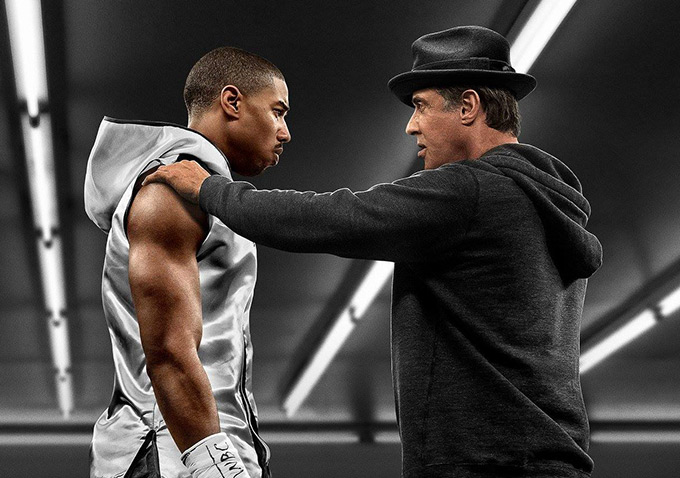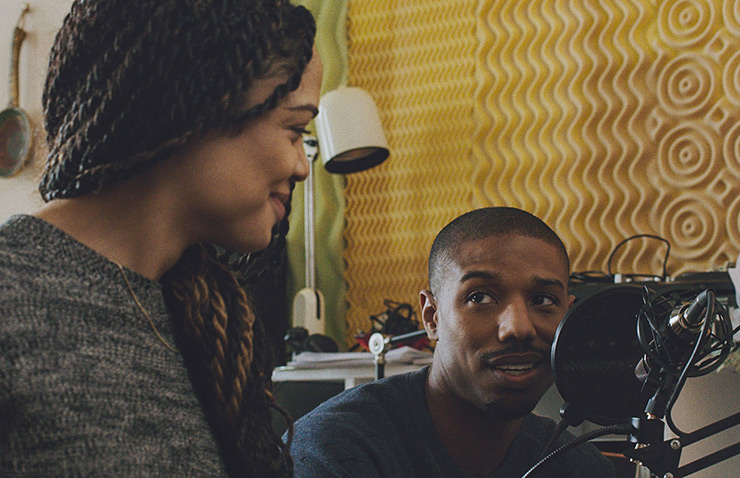By providing your information, you agree to our Terms of Use and our Privacy Policy. We use vendors that may also process your information to help provide our services. This site is protected by reCAPTCHA Enterprise and the Google Privacy Policy and Terms of Service apply.
Review: ‘Creed’ is a ‘Rocky’ Reboot Worth Rooting For
Eric Kohn

READ MORE: Life After Ferguson: Why Ryan Coogler and Ava DuVernay Support Blackout, the Black Friday Boycott
The same year that “Star Wars” and “Jurassic Park” are refurbished for new generations, here’s a franchise revision worth more than its commercial value: With “Creed,” writer-director Ryan Coogler revitalizes the “Rocky” legacy by effectively shifting away from the aging protagonist to anoint a new hero.
Foregrounding the ambitions of the late Apollo Creed’s son Adonis (Michael B. Jordan), while relegating Rocky Balboa to the sidelines as the young man’s coach, “Creed” wrestles the narrative from Stallone’s tired bones and drags his appeal into the 21st century.
 While technically the second “Rocky” entry in the new millennium, following the Stallone-directed “Rocky Balboa” in 2006, it’s the first to capture a wholly contemporary feel. If Bush-era cinema is defined by militaristic narratives of overseas incursions, “Creed” suggests the belated arrival of an Obama alternative: A bracing tale of black heroism in which blackness is beside the point.
While technically the second “Rocky” entry in the new millennium, following the Stallone-directed “Rocky Balboa” in 2006, it’s the first to capture a wholly contemporary feel. If Bush-era cinema is defined by militaristic narratives of overseas incursions, “Creed” suggests the belated arrival of an Obama alternative: A bracing tale of black heroism in which blackness is beside the point.
Seven movies in, the “Rocky” movies exist within a subgenre that generally follows the same beats each time out: Hardened fighter faces reservations about high profile fight, ultimately bites the bullet, trains a bunch and finally kicks ass on national television. “Creed” apes that formula to near-perfection, but it does so without feeling reductive. Much of that stems from Coogler’s steady hand behind the camera and Jordan’s gripping performance in front of it. Stallone himself, now grumbling his way into old age, provides ample support that links the proceedings to the baggage of past installments. As a result, “Creed” does justice to its roots while trying something new.
While Rocky’s mythology has always been defined by his working class background, Adonis faces the same uphill battle as the series itself: Having learned in his adolescence that his father was killed in the ring, he’s inherited plenty of money but also a menacing shadow. The iconic character played by Carl Weathers (until his death in the ring at the hands of Dolph Lundgren’s absurd Soviet villain in “Rocky IV”) may have fallen prey to an unconvincing scenario — but “Creed” turns that bizarre twist into the source of Apollo’s identity crisis. On the one hand, he’s committed to fulfilling his father’s legacy, but it’s so much larger than life that he struggles to reconcile it with his immediate needs.
 “Creed” establishes a newly realistic foundation for the “Rocky” storyline early on, with a gritty prologue in the late nineties, where the belligerent 12-year-old has been drifting around juvenile detention facilities. It’s there that Apollo’s nurturing widow (Phylicia Rashad) finds him and — though she’s not his real mother — takes the young man home. Cut to 2015 and Tijuana, where Adonis has quietly slipped away from his drab office job to engage in grisly prize fighting, hiding his lineage on the public stage while secretly pushing to fulfill his own expectations.
“Creed” establishes a newly realistic foundation for the “Rocky” storyline early on, with a gritty prologue in the late nineties, where the belligerent 12-year-old has been drifting around juvenile detention facilities. It’s there that Apollo’s nurturing widow (Phylicia Rashad) finds him and — though she’s not his real mother — takes the young man home. Cut to 2015 and Tijuana, where Adonis has quietly slipped away from his drab office job to engage in grisly prize fighting, hiding his lineage on the public stage while secretly pushing to fulfill his own expectations.
Back in Philadelphia, he hides those ambitions from his adopted mother, but ultimately can’t resist tracking down Rocky — now a humble restaurant owner at the cozy diner named for his late wife — to talk him into coaching the young man. Thus, past and present unite, and “Creed” is off to the “Rocky” races, horn-blaring soundtrack, training montages and all. When the wizened Stallone mutters, “I don’t do that no more,” you know it’s only a matter of time before he does.
But there’s an enormously satisfying tilt to these proceedings, which play out like exceedingly well-directed fan fiction even as they add to the “Rocky” canon. It’s essentially a hypothetical question transformed into a feature-length format: What if “Rocky” stopped dominating the show and instead passed the baton? The result is a bonafide sports movie, but also something of a cultural statement: The “Rocky” ethos stand the test of time, even if Rocky himself can’t.
 Of course, this kind of brawny storytelling has its limits, and at times “Creed” goes too far with its indulgence in the material at hand. Onscreen graphics featuring the stats of every player over freeze frames feel like perfunctory device that pander to boxing junkies; a subplot involving a life-threatening event surrounding one major character reeks of tacked-on sentimentality. Overall, however, Coogler keeps the “Rocky” salutes in subtle mode, even restraining the famous score until the big moments arrive.
Of course, this kind of brawny storytelling has its limits, and at times “Creed” goes too far with its indulgence in the material at hand. Onscreen graphics featuring the stats of every player over freeze frames feel like perfunctory device that pander to boxing junkies; a subplot involving a life-threatening event surrounding one major character reeks of tacked-on sentimentality. Overall, however, Coogler keeps the “Rocky” salutes in subtle mode, even restraining the famous score until the big moments arrive.
Most impressively, “Creed” grounds its character in the present moment. Much about earlier “Rocky” movies exist in a time capsule of America in the seventies and eighties, from the media to the music to Hollywood’s obsession with masculine posturing in the post-Vietnam era. “Creed” never gets explicitly political, but it does give its story a contemporary feel. Adonis’ relationship to the “Rocky” narrative unfolds through the technology at his disposal: Adonis pulls up videos of his dad’s fights on YouTube and shadows his movements; after hours, he watches HBO sports documentaries on his iPad, one of which features future opponent “Pretty” Ricky Conland (Tony Bellew). When Rocky scribbles down a workout routine and Adonis grabs the notes on a smartphone photo he stores “in the cloud,” Rocky’s baffled expression as he looks to the heavens is priceless.
The world has changed a lot since Rocky first swung his fists, which validates the shift to a new protagonist. By “Rocky Balboa,” the character had nowhere left to go but permanent retirement. Short of fighting space aliens, his only logical step was to foster a new generation. And so he has.
 “Creed” not only builds on the “Rocky” foundation with a fresh leading man but the world around him as well. “Dear White People” star Tessa Thompson delivers an convincing supporting performance as the gentle musician who becomes Adonis’ main squeeze. Rather than simply filling the Adrian role, Thompson lands a few good scenes to make her case against the masculine gaze in play. “Maybe you’re just motivation to me, too,” she says. The symbolism of that statement, 40-plus years after the first “Rocky,” cuts deep.
“Creed” not only builds on the “Rocky” foundation with a fresh leading man but the world around him as well. “Dear White People” star Tessa Thompson delivers an convincing supporting performance as the gentle musician who becomes Adonis’ main squeeze. Rather than simply filling the Adrian role, Thompson lands a few good scenes to make her case against the masculine gaze in play. “Maybe you’re just motivation to me, too,” she says. The symbolism of that statement, 40-plus years after the first “Rocky,” cuts deep.
“Creed” ultimately winds up in the ring, as every “Rocky” movie must. But if that’s the main limitation of the formula, “Creed” reminds us that it’s also an art form. (John Woo has his bullet ballets; “Rocky” movies explore the poetry of the brawl.)
Cinematographer Maryse Alberti notably brought the zanier side of the wrestling field to life in Darren Aronofsky’s “The Wrestler,” but the production values are far snazzier here: When Adonis finally faces down his foe in yet another widely televised match with his reputation on the line, Coogler unleashes some of the most technically accomplished cinematic fight scenes in recent memory. Slick tracking shots, viscerally unnerving closeups and a complex sound design featuring Rocky’s voice from the ringside all contribute to marvelously intense sense of disorientation.
It ups the ante for “Rocky” fight scenes while doing them proud. As Rocky encourages his disciple to “use the name,” Coogler follows the suit by using the tropes. The entire “Rocky” franchise is better for it.
Grade: A-
“Creed” opens nationwide on November 25.
READ MORE: Mayor of Philadelphia Proclaims November 25th “‘Creed’ Day”
By providing your information, you agree to our Terms of Use and our Privacy Policy. We use vendors that may also process your information to help provide our services. This site is protected by reCAPTCHA Enterprise and the Google Privacy Policy and Terms of Service apply.















